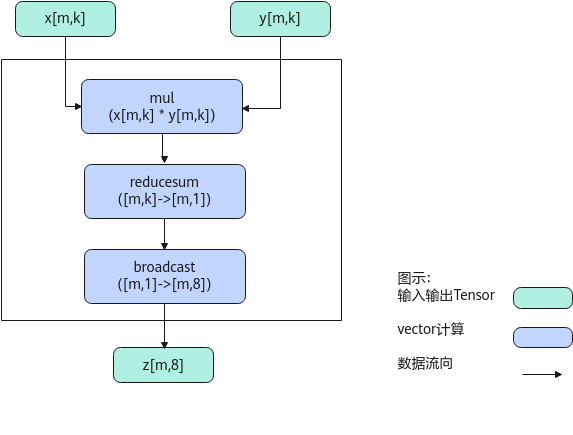SoftmaxGradFront
功能说明
将输入tensor[m0, m1, ...mt, n](t大于等于0)的非尾轴长度相乘的结果看作m,则输入tensor的shape看作[m, n]。对输入tensor[m,n]按行做gradfront反向计算,计算公式如下:

当输入shape为ND格式时,内部的reduce过程按last轴进行;当输入shape为NZ格式时,内部的reduce过程按照last轴和first轴进行,reduce过程可以参考SoftMax中的图示说明。
为方便理解,通过python脚本实现的方式,表达其计算公式如下,其中dx、y是源操作数(输入),d为目的操作数(输出)。
def softmax_grad_front(dx, y, is_fp16=False):
dx = dx.astype(np.float32)
y = y.astype(np.float32)
d = (dx * y).sum(axis=-1, keepdims=True) ###[1024,1]
if is_fp16:
d = d.astype(np.float16)
return d
实现原理
以float类型,ND格式,shape为[m, k]的输入Tensor为例,描述SoftmaxGradFront高阶API内部算法框图,如下图所示。

计算过程分为如下几步,均在Vector上进行:
- mul步骤:对输入x和y所有数据相乘,计算结果会保存到一个临时空间temp中;
- reducesum步骤:对temp中的数据([m, k])每一行数据求和得到[m, 1],计算结果保存到临时空间中;
- broadcast步骤:对[m, 1]做一个按datablock为单位的填充,比如float类型下,把[m, 1]扩展成[m, 8],并输出结果z。
函数原型
- 接口框架申请临时空间
1 2
template <typename T, bool isBasicBlock = false, bool isDataFormatNZ = false> __aicore__ inline void SoftmaxGradFront(const LocalTensor<T>& dstTensor, const LocalTensor<T>& gradTensor, const LocalTensor<T>& srcTensor, const SoftMaxTiling& tiling, const SoftMaxShapeInfo& softmaxShapeInfo = {})
- 通过sharedTmpBuffer入参传入临时空间
1 2
template <typename T, bool isBasicBlock = false, bool isDataFormatNZ = false> __aicore__ inline void SoftmaxGradFront(const LocalTensor<T>& dstTensor, const LocalTensor<T>& gradTensor, const LocalTensor<T>& srcTensor, const LocalTensor<uint8_t>& sharedTmpBuffer, const SoftMaxTiling& tiling, const SoftMaxShapeInfo& softmaxShapeInfo = {})
由于该接口的内部实现中涉及复杂的计算,需要额外的临时空间来存储计算过程中的中间变量。临时空间支持接口框架申请和开发者通过sharedTmpBuffer入参传入两种方式。
- 接口框架申请临时空间,开发者无需申请,但是需要预留临时空间的大小。
- 通过sharedTmpBuffer入参传入,使用该tensor作为临时空间进行处理,接口框架不再申请。该方式开发者可以自行管理sharedTmpBuffer内存空间,并在接口调用完成后,复用该部分内存,内存不会反复申请释放,灵活性较高,内存利用率也较高。
接口框架申请的方式,开发者需要预留临时空间;通过sharedTmpBuffer传入的情况,开发者需要为tensor申请空间。临时空间大小BufferSize的获取方式如下:通过SoftmaxGrad Tiling接口中提供的GetSoftMaxGradMaxTmpSize/GetSoftMaxGradMinTmpSize接口获取所需最小和最大临时空间大小,最小空间可以保证功能正确,最大空间用于提升性能。
参数说明
|
参数名 |
描述 |
|---|---|
|
T |
操作数的数据类型。 |
|
isBasicBlock |
srcTensor和gradTensor的shape信息和Tiling切分策略满足基本块要求的情况下,可以使能该参数用于提升性能,默认不使能。基本块要求如下:
针对Atlas 200/500 A2推理产品,该参数为预留参数,暂未启用,为后续的功能扩展做保留,保持默认值即可。 |
|
isDataFormatNZ |
当前输入输出的数据格式是否为NZ格式,默认数据格式为ND。 针对Atlas 200/500 A2推理产品,不支持配置为NZ格式。 |
|
参数名 |
输入/输出 |
描述 |
|---|---|---|
|
dstTensor |
输出 |
目的操作数。 类型为LocalTensor,支持的TPosition为VECIN/VECCALC/VECOUT。 Atlas A2训练系列产品/Atlas 800I A2推理产品,支持的数据类型为:half/float Atlas推理系列产品AI Core,支持的数据类型为:half/float Atlas 200/500 A2推理产品,支持的数据类型为:half/float last轴长度固定32Byte即一个datablock长度,并且该datablock中的所有数据为同一个值。比如half数据类型下,该datablock里的16个数均为相同的值,非last轴长度需要和srcTensor保持一致。 |
|
gradTensor |
输入 |
源操作数。 类型为LocalTensor,支持的TPosition为VECIN/VECCALC/VECOUT。 Atlas A2训练系列产品/Atlas 800I A2推理产品,支持的数据类型为:half/float Atlas推理系列产品AI Core,支持的数据类型为:half/float Atlas 200/500 A2推理产品,支持的数据类型为:half/float last轴长度需要32Byte对齐。 |
|
srcTensor |
输入 |
源操作数。 类型为LocalTensor,支持的TPosition为VECIN/VECCALC/VECOUT。 Atlas A2训练系列产品/Atlas 800I A2推理产品,支持的数据类型为:half/float Atlas推理系列产品AI Core,支持的数据类型为:half/float Atlas 200/500 A2推理产品,支持的数据类型为:half/float last轴长度需要32Byte对齐。 |
|
sharedTmpBuffer |
输入 |
临时空间。 类型为LocalTensor,支持的TPosition为VECIN/VECCALC/VECOUT。 该操作数的数据类型固定uint8_t。 用于接口内部复杂计算时存储中间变量,由开发者提供。 临时空间大小BufferSize的获取方式请参考SoftmaxGrad Tiling接口。 |
|
tiling |
输入 |
softmaxgradfront计算所需tiling信息,Tiling信息的获取请参考SoftmaxGrad Tiling接口。 |
|
softmaxShapeInfo |
输入 |
srcTensor的shape信息。SoftMaxShapeInfo类型,具体定义如下: struct SoftMaxShapeInfo {
uint32_t srcM; // 非尾轴乘积长度
uint32_t srcK; // 尾轴长度,必须32Byte对齐
uint32_t oriSrcM; // 原始非尾轴乘积长度
uint32_t oriSrcK; // 原始尾轴长度
};
需要注意,当输入输出的数据格式为NZ格式时,尾轴长度为reduce轴长度即图2中的W0*W1,非尾轴为H0*H1。 |
返回值
无
支持的型号
Atlas A2训练系列产品/Atlas 800I A2推理产品
Atlas推理系列产品AI Core
Atlas 200/500 A2推理产品
注意事项
- 操作数地址偏移对齐要求请参见通用约束。
调用示例
#include "kernel_operator.h"
template <typename T> class KernelSoftmaxGrad {
public:
__aicore__ inline KernelSoftmaxGrad() {}
__aicore__ inline void Init(__gm__ uint8_t* src1Gm, __gm__ uint8_t* src2Gm, __gm__ uint8_t* dstGm, const SoftMaxTiling& tilingData)
{
elementNumPerBlk = 32 / sizeof(T);
src1Global.SetGlobalBuffer((__gm__ T*)src1Gm);
src2Global.SetGlobalBuffer((__gm__ T*)src2Gm);
dstGlobal.SetGlobalBuffer((__gm__ T*)dstGm);
pipe.InitBuffer(inQueueSrc1, 1, height * width * sizeof(T));
pipe.InitBuffer(inQueueSrc2, 1, height * width * sizeof(T));
pipe.InitBuffer(outQueueDst, 1, height * elementNumPerBlk * sizeof(T));
tiling = tilingData;
}
__aicore__ inline void Process()
{
CopyIn();
Compute();
CopyOut();
}
private:
__aicore__ inline void CopyIn()
{
AscendC::LocalTensor<T> srcLocal1 = inQueueSrc1.AllocTensor<T>();
AscendC::LocalTensor<T> srcLocal2 = inQueueSrc2.AllocTensor<T>();
AscendC::DataCopy(srcLocal1, src1Global, height * width);
AscendC::DataCopy(srcLocal2, src2Global, height * width);
inQueueSrc1.EnQue(srcLocal1);
inQueueSrc2.EnQue(srcLocal2);
}
__aicore__ inline void Compute()
{
AscendC::LocalTensor<T> srcLocal1 = inQueueSrc1.DeQue<T>();
AscendC::LocalTensor<T> srcLocal2 = inQueueSrc2.DeQue<T>();
AscendC::LocalTensor<T> dstLocal = outQueueDst.AllocTensor<T>();
AscendC::SoftMaxShapeInfo srcShape = { height, width, height, width };
AscendC::SoftmaxGradFront<T>(dstLocal, srcLocal2, srcLocal1, tiling, srcShape);
outQueueDst.EnQue<T>(dstLocal);
inQueueSrc1.FreeTensor(srcLocal1);
inQueueSrc2.FreeTensor(srcLocal2);
}
__aicore__ inline void CopyOut()
{
AscendC::LocalTensor<T> dstLocal = outQueueDst.DeQue<T>();
AscendC::DataCopy(dstGlobal, dstLocal, height * elementNumPerBlk);
outQueueDst.FreeTensor(dstLocal);
}
private:
AscendC::TPipe pipe;
AscendC::TQue<AscendC::QuePosition::VECIN, 1> inQueueSrc1;
AscendC::TQue<AscendC::QuePosition::VECIN, 1> inQueueSrc2;
AscendC::TQue<AscendC::QuePosition::VECOUT, 1> outQueueDst;
AscendC::GlobalTensor<T> src1Global, src2Global, dstGlobal;
uint32_t elementNumPerBlk = 0;
uint32_t width = 64;
uint32_t height = 128;
SoftMaxTiling tiling;
};
extern "C" __global__ __aicore__ void softmax_grad_kernel_half(__gm__ uint8_t* src1Gm, __gm__ uint8_t* src2Gm, __gm__ uint8_t* dstGm, __gm__ uint8_t* tiling)
{
GET_TILING_DATA(tilingData, tiling);
KernelSoftmaxGrad<half> op;
op.Init(src1Gm, src2Gm, dstGm, tilingData.softmaxTilingData);
op.Process();
}